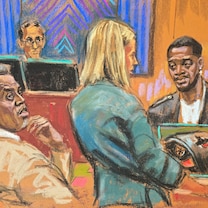Subprime CEOs Explain Why They Made Millions While Americans Lost Homes
Three CEOs testify about the subprime mortgage collapse and their pay packages.
March 7, 2008 — -- Congressional Democrats got right to the point today: How could the CEOs of three companies behind the subprime mortgage market make millions of dollars while thousands of Americans lost their homes and investors lost billions of dollars?
"There seem to be two different economic realities operating in our country today. And the rules of compensation in one world are completely different from those in the other," said Rep. Henry Waxman, D-Calif., chairman of the House Committee on Oversight and Government Reform. "Most Americans live in a world where economic security is precarious and there are real economic consequences for failure. But our nation's top executives seem to live by a different set of rules."
In 1980, chief executives in the United States were paid 40 times what the average worker made. They now make 600 times the average worker's salary, Waxman said.
"I think there's merit to pay for performance," Waxman said. "But it seems like CEOs hit the lottery even when their companies collapse."
But the Republican ranking member on the committee warned that he would not let the hearing turn into a witch-hunt.
Rep. Tom Davis, R-Va., said it is not the job of Congress to second-guess investor decisions or to help plaintiffs gather evidence for their lawsuits. He said it is fair to question compensation packages but warned that the debate should not turn into a "sanctimonious search for scapegoats."
"Punishing individual corporate executives with public floggings like this may be a politically satisfying ritual -- like an island tribe sacrificing a virgin to a grumbling volcano," Davis said.
The highlight of the hearing came when Countrywide Financial Corp. chairman and chief executive officer Angelo Mozilo, former Merrill Lynch CEO E. Stanley O'Neal and Charles Prince, former chairman and CEO of Citigroup, took an oath and started to testify.
But for the thousands of Americans struggling with their mortgages who might be hoping for somebody to show remorse for the downturn, this was not the place to look.
The CEOs did not take any personal responsibility for the housing market meltdown. Instead, they focused on a series of other economic factors and noted repeatedly how they helped many Americans — who might have not otherwise been able to afford homeownership — get into their first homes.





